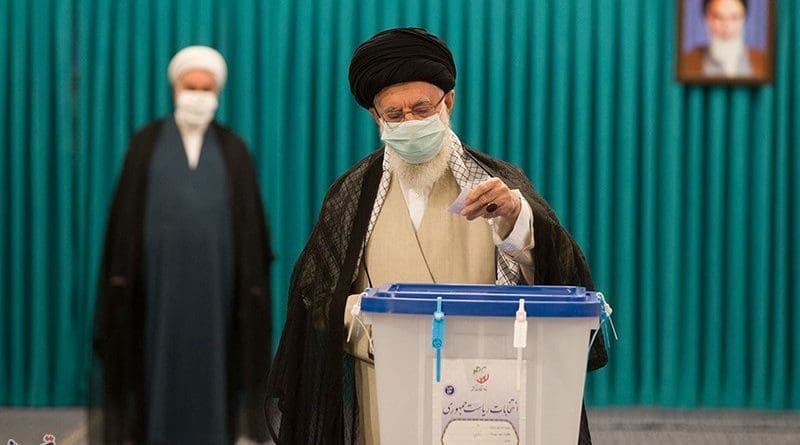Iran: Voting Under Way In Presidential Election Likely To Bring Hard-Liner To Power
By RFE RL
(RFE/RL) — Voting is under way in Iran in a presidential poll widely expected to be won by a hard-liner who is under U.S. sanctions.
The election on June 18 is taking place amid widespread voter apathy prompted by worsening economic conditions, state mismanagement, and the coronavirus pandemic.
Iran’s highest authority, Supreme Leader Ayatollah Ali Khamenei, has encouraged Iranians to vote. He has also lashed out against what he said were the country’s “enemies” — accusing them of discouraging people from taking part in the election.
Meanwhile, state television showed long queues outside polling stations in several cities.
However, RFE/RL’s Radio Farda received several videos that purported to show polling stations in Tehran and other cities where only a few people could be seen. The authenticity of the clips could not be verified.
“Each vote counts… come and vote and choose your president,” Khamenei said after casting his ballot in Tehran. “This is important for the future of your country.”
The election comes amid uncertainty surrounding efforts to revive a landmark 2015 nuclear deal with world powers. The turnout is being regarded by observers as a verdict on the ruling theocracy’s handling of a growing number of crises.
A strict vetting process eliminated the vast majority of reformist candidates — bolstering Ebrahim Raisi’s position as the leading candidate. The 60-year-old hard-line cleric heads Iran’s judiciary and is widely expected to replace two-term President Hassan Rohani.
Raisi was one of the Iranian judges in 1988 who oversaw a series of speedy trials in which thousands of political prisoners were sentenced to death and executed. Human rights organizations say he is guilty of crimes against humanity. The United States has placed him under sanctions.
Interior Minister Abdolrahman Fazli said voting has been proceeding smoothly at all 70,000 polling stations despite reports earlier in the day of problems at some polling stations.
Raisi’s main challenger and the only relative moderate left in the race is Abdolnaser Hemmati. Iran’s powerful vetting body, the Guardians Council, has prevented prominent reformist candidates from running, while others dropped out of the race.
Hemmati served as Iran’s central bank chief before he was dismissed in order to run for president.
Hemmati, 64, still lags behind. Public opinion polls suggest his support is in the single digits despite gaining some momentum late in his campaign by criticizing state restrictions and reaching out to reform-minded Iranians.
Two more hard-liners, Mohsen Rezai, a former commander of the Islamic Revolutionary Guards Corps (IRGC), and Amir Hossein Ghazizadeh Hashemi, who served as parliament’s first deputy speaker, remain in the race.
Analysts say the vote could produce the country’s lowest ever turnout, casting further doubts over the popular legitimacy of the winner.
Contrary to state media reports, one voter who did not give her full name told Reuters on June 18 that polling stations were “almost empty” in the central Iranian city of Yazd.
A survey conducted by the Iranian Student Polling Agency suggests that only 42 percent of the country’s 59 million registered voters planned to cast ballots. If that prediction holds true, it would be a massive decline compared to the 73 percent turnout for Iran’s previous presidential election in 2017.
The highest turnout for an Iranian presidential election since the Islamic revolution of 1979 that brought the current theocracy into power was 85.2 percent in 2009. The lowest was 50.6 percent in 1993.
Hossein Hassanpour, a deputy police chief in Iran’s northern province of Gilan, says 27 people were detained early on June 18 for endangering “the health and security of the elections.” He did not provide further details.
Solat Mortazavi, a representative of Raisi’s campaign headquarters, said there had been “disruptions” in the voting process in some polling centers in southern Tehran.
Many Iranians have said they will not be voting due to severely restricted choices. They also cited frustration over the economy, state repression, and disillusionment with politicians who have failed to bring change.
“They’re offering five bananas, saying ‘Choose any fruit you want,'” one Iranian man complained during a recent open tribune in the central city of Isfahan. “How can you pick an orange from five bananas?”
Rohani, whose key achievement as president was the 2015 deal under which Iran agreed to limit its nuclear program in return for sanctions relief, urged other Iranians to vote when he cast his ballot on June 18.,
“I hope the presence of the people and a large turnout will disappoint the enemies,” Rohani was quoted as saying by IRNA.
If no candidate wins an overall majority on June 18, the two with the most votes will go head-to-head in a second-round runoff.
Iran’s economy was hit hard when former President Donald Trump withdrew the United States from Iran’s nuclear deal in 2018 and reimposed crippling sanctions. Inflation has reached nearly 40 percent and the official unemployment rate stands at 11 percent.
Analysts agree that a win for Raisi would signal the rise of anti-Western hardliners to the detriment of pragmatists like Rohani whose standing has been damaged by Trump’s decision despite President Joe Biden’s promise to rejoin the agreement if Iran returns to full compliance.
However, it is Khamenei, not the president, who has the last say on Iran’s nuclear and foreign policies. Therefore, a Raisi victory would not necessarily disrupt Iran’s current efforts to revive the agreement and reverse the sanctions.
Polls are due to close at midnight local time, but voting can be extended for as long as two hours. Initial results are expected on June 19.

